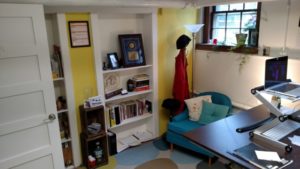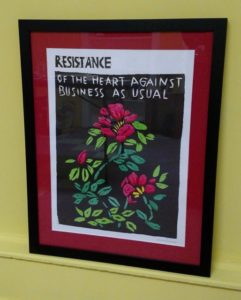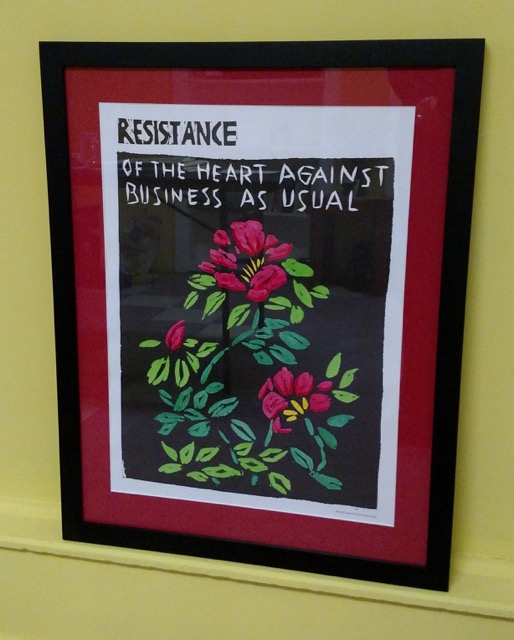Originally published in the May/June 2017 issue of Quill, the bimonthly magazine of the Society of Professional Journalists
“Unless you know exactly what you want, you’re sure not to get it.”
I could attempt to diagram that sentence. Instead, I’ll explain how this nugget of advice became a cornerstone of my freelance business — and how it can help yours, too.
The sentence stuck with me for years after meeting a friend of my in-laws one Christmas Eve. Bill is a self-made millionaire — twice so actually, having lost everything around mid-life and rebounding. I know Bill as intense and charming and generous — with gifts as well as wisdom. In telling me his story, he shared the secret of his success.

I could have applied for a full-time job this spring. Instead, I settled into my own new office.
Perhaps the awkwardness of the sentence syntax is part of why it stuck with me. But more so, the advice simply resonated. It articulated in a new way something I had long admired in others and tried to cultivate in my own life: Self-direction. A sense of agency. Firm rooting. Clear goals.
The sentence echoed in my mind years later as I reluctantly realized that my staff reporting position wasn’t satisfying crucial elements of my drive for journalism. I kept returning to that sentence as I grappled with the question: If this job isn’t what I want, what do I want instead?
“Unless you know exactly what you want, you’re sure not to get it.”
I knew I wanted to get it. I just didn’t know what “it” was. But I’m a journalist, a storyteller. We find and choose details that illustrate and symbolize the deeper concepts we report on. So, I got to work.
I journaled. I talked things through with my husband, family, close friends and professional mentors. I compared options (various jobs and freelancing potential), breaking down the good/bad/ugly elements of each. I assessed my resources and strengths alongside anything working against me. Finally, I ignored what “it” might look like and focused instead on the values underlying my sense of success.
Only when I found those roots did I start to imagine the shapes they may take. Going back to the options I had researched, I checked off whether they got me any closer to the “it” I was after.
I’m now in my third year of full-time freelancing. Not every client and project satisfies all five of the criteria I landed on. But, my combined portfolio of work advances them all. There’s still more success to strive for, but I see evidence and feel in my heart that I’m on the right path. It’s amazing, and I wish this sense of satisfaction for you, too.
No matter where you are in your freelance business — successful and loving it, thinking of striking out solo, or somewhere in between — here are some resources I’ve found helpful in any stage. These may help you formulate a vision, bring it to the next level with an action plan, tap the collective wisdom of the SPJ Freelance Community, or simply find the camaraderie we often miss not working from a newsroom:
-
“Lean” business planning is a pared back approach in which you can invest as much or as little time as you’d like. The Internet is riddled with advice on this. I’ve found Tim Berry’s template at www.leanplan.com helpful.
-
A 12-month cashflow lays out the big picture of your financial cycles. SCORE offers a great template at www.score.org/resource/12-
month-cash-flow-statement. I’ve added fields to mine to help schedule my editorial calendar around my cashflow needs. -
On Your Own: A Guide to Freelance Journalism is an online book written by SPJ freelance members over the years. It covers everything from introductory issues and business considerations to finances, marketing and other tools. (Note: Access is free, but only available to SPJ members.)
-
SPJ’s Freelance Community is also a phenomenal brain trust. Our Facebook group is 550+ strong, and we host occasional old-school, online chats about a variety of issues. Please join us and chime in!
And if you’re looking for clarity about what you’re after, here are some prompts to help you get started. These may not yield quick answers, so give yourself as much time and mental space as possible to work through them, even if that means returning to them time and again until you’ve arrived at a response that feels complete.
-
If money were no object, how would you want to spend your time?
-
If you could live anywhere, where would you want to be?
-
Where are you “at” with work now — whether freelance or other employment? List specifically what you like about it and what you don’t.
-
How much money do you actually need? How much do you really want?
-
If you were to diversify your offerings — perhaps by working in different mediums — what would be the perfect blend?
-
If you could focus on only one project, what would it be?
-
Who’s your ideal client, and what’s so perfect about them?

This Bread & Puppet poster has served as my motto and guiding star for more than 20 years.
The clarity and support I’ve found from those resources and reflections has helped me stay firmly rooted in my freelance business plan. I’ve even turned down work when money was tight — because some “opportunities” are actually distractions in disguise, and if they lead you too far astray, it can be hard to get back on track. Knock on wood: I’ve found that keeping my focus, to the greatest extent feasible, usually pays off.
I got to see Bill again last Christmas Eve. He beamed when I told him that his single sentence had helped me so much. He knew exactly what I was referring to, and even completed the sentence in unison with me as I recited it back to him. It turns out, that’s one of the first lessons he instills in anyone he mentors.
He then told me the second: Knowing exactly what you want doesn’t mean you’re always going to get it! Be prepared for disappointments. Just return to the drawing board when you meet them, and keep going after your goals.
And I’ll add: What you want may change over time. Return often to those prompts and planning resources to re-evaluate the needs and desires that comprise your path’s foundation. Also, don’t assume that just because something is working, something else couldn’t work better.
As freelancers, we enjoy unique latitude to chart our own course. Give your work the respect it deserves by staying actively engaged with your business. The more you do so, the more likely it will achieve true success — as a reflection of you.
